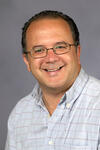In The News: College of Sciences
It was a down-in-the-mud presidential campaign, but the dirtiest part comes on Inauguration Day.
It was a down-in-the-mud presidential campaign, but the dirtiest part comes on Inauguration Day.
It was a down-in-the-mud presidential campaign, but the dirtiest part comes on Inauguration Day.
It was a down-in-the-mud presidential campaign, but the dirtiest part comes on Inauguration Day.
The Physics World 2020 Breakthrough of the Year goes to Elham Fadaly, Alain Dijkstra and Erik Bakkers at Eindhoven University of Technology in the Netherlands, Jens Renè Suckert at Friedrich-Schiller-Universität Jena in Germany and an international team for creating a silicon-based material with a direct band gap that emits light at wavelengths used for optical telecommunications.

In March, when cases of COVID-19 began to overwhelm hospitals in the United States, I told my 90-year-old mother that she had to shelter in place. She lives alone in Los Angeles, and to keep her company, I FaceTimed her every night. In the role reversal that happens with time, I became the forever-worried, nagging parent, and she was the ever-doubting, defiant child.
The ancient people of western Utah’s Danger Cave lived well. They ate freshwater fish, ducks and other small game, according to detritus they left behind. They had a lush lakeside view, with cattails, bulrushes and water-loving willows adorning the marshlands.
One of the highlights in the Physics World calendar is the announcement of our Breakthrough of the Year, which will be made this year on Thursday 17 December.

On Tuesday evening, the state released a comprehensive strategy for reducing greenhouse gas emissions to net-zero by 2050. It’s a big deal, marking a year-long effort among state agencies to develop a coordinated pathway for moving toward defined emission-reduction benchmarks.

On Tuesday evening, the state released a comprehensive strategy for reducing greenhouse gas emissions to net-zero by 2050. It’s a big deal, marking a year-long effort among state agencies to develop a coordinated pathway for moving toward defined emission-reduction benchmarks.
From ultra-fast bullet trains to new-age medical equipment, superconductors could fundamentally change society. In the U.S. alone, about six percent of electricity passing through a typical power grid in a year is lost and becomes heat, which costs billions of dollars.
The ancient people of Danger Cave lived well. They ate freshwater fish, ducks and other small game, according to detritus they left behind. They had a lush lakeside view, with cattails, bulrush and water-loving willows adorning the marshlands.


